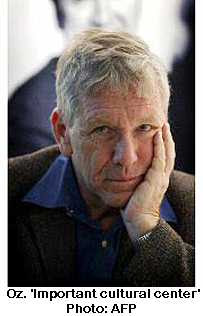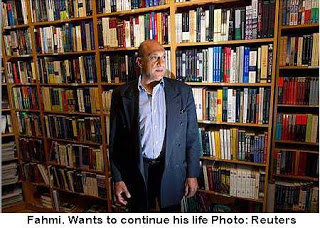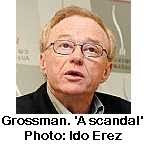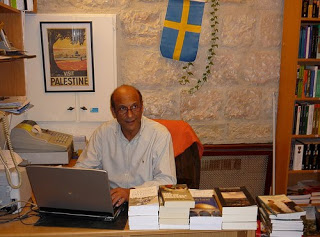This is a story I wanted to post earlier in the year. A Palestinian owner of a bookshop in East Jerusalem, someone who was born there, is threatened with deportation for overstaying his tourist visa. I, who was never born and never lived in Israel, can go and claim my ‘right of return’ and citizenship because my mother is Jewish.
What was that about Zionism and Racism?
We hear a lot about how culture and politics don’t mix. Well here is a good example of the mix between Israeli politics and racism and Palestinian culture. No doubt the Lebrecht’s and other hypocrites, for whom culture is a western phenomenon, will continue to remain silent as Palestinian culture is assailed.
As far as I’m aware, the Israeli authorities appear to have backed down for fear of even more adverse publicity. Even Netanyahu and Lierberman probably have difficulties portraying a bookseller as a terrorist!
Tony Greenstein
Mar 24th 2011, 3:40 by G.L. | NEW YORK
MUNTHER FAHMI has not always been popular with customers who pay the high prices at his bookshop in East Jerusalem’s American Colony Hotel. Nor with foreign authors, a few of whom have been known to mutter that he reprinted their books without permission. But his roguish charm and his proprietorship of what is, in a former Israeli foreign minister’s words, “the only decent English-language bookshop in the country”, have helped him become a small but essential link in Israeli-Palestinian intellectual life. His shop is one of the very few in Israel or the occupied territories where all the serious literature and reporting about the world’s most closely watched conflict can be bought in English. The book readings he organises in the American Colony’s elegant old reception rooms are among the occasions when foreign diplomats, journalists, aid workers and writers and a few of the more broad-minded members of the Israeli and Palestinian political establishments gather to chew over solutions to the struggle that, in one way or another, keeps them all in business.
Now Mr Fahmi faces deportation for overstaying his tourist visa. Not that he is a tourist by any common-sense notion of the word. He was born in Jerusalem, left at the age of 21 to study in America, started a family and 20 years later, in the mid-1990s, returned home, “intoxicated”, in his words, “with prospects of peace after the signing of the Oslo agreement.” However, he was told he no longer had a right to live there. Mr Fahmi was born in 1954 in what was then Jordanian-occupied East Jerusalem, and like most Palestinian Jerusalemites at the time, his family did not accept the offer of Israeli citizenship when Israel annexed the eastern part of the city after the war of 1967, but (in protest at the annexation) only permanent residence. And Israel, like many countries, revokes permanent residency for anyone who lives abroad for more than a certain length of time.
So Mr Fahmi began taking out tourist visas, which the authorities let him keep renewing, even turning a blind eye to the fact that he had opened a business. But two years ago they started giving him “a hard time”. On engaging a lawyer, he says, he discovered that he could in fact have reclaimed his residency, which had remained in force until 2002. Whatever the truth, his supreme-court appeal has since failed. Unless the interior ministry looks kindly on him—and the minister, Eli Yishai of the ultra-right Shas party, is not known to look kindly on Arabs—his time will run out on April 3rd.
Is it Mr Fahmi’s role in keeping the debate about the conflict alive that has annoyed the Israeli authorities? Perhaps; but more likely, he is just another of what are thought to be thousands of Palestinian-born repatriates whom Israel kept in legal limbo by letting them stay as tourists but is now forcing out as part of its attempt to maintain the demographic upper hand of Jews over Arabs. Legally, it is within the country’s rights to do so. But Mr Fahmi’s case does it no favours on the public-relations front (an international petition in support of his right to live in East Jerusalem is making the rounds). It merely highlights the injustice of a system that allows members of one tribe to return after 2,000 years, but forbids members of another, even if they were born there, to come home after two decades.
Ha’aretz, Published 01:10 22.03.11
By Nir Hasson
Munther Fahmi is a well-known figure in Jerusalem’s diplomatic community and among the city’s foreign press corps. A visit to his small bookstore at the American Colony Hotel is a must for anyone seeking to immerse himself in the roots of the Arab-Israeli conflict. Among his many and well-known patrons are ambassadors, authors and politicians, including former U.S. President Jimmy Carter and European Union foreign policy chief Catherine Ashton.
But it appears all the connections in the world are no match for Israel’s Interior Ministry, which is now seeking to have Fahmi deported.
Fahmi, a Palestinian, was born in Jerusalem and lived there until he was 21, when he left for the United States for 20 years. He married in the U.S. and acquired an American passport.
He visited Israel often and ultimately returned to Jerusalem to live in 1993, though his Israeli residency rights were revoked in the interim.
Like most Arab residents of East Jerusalem who chose not to apply for Israeli citizenship, Fahmi had Israeli residency, but not citizenship. Residency is automatically revoked in the event of an absence of many years or the acquisition of citizenship from another country.
Over the past 17 years, Fahmi has entered and left Israel using his American passport and was generally here on a tourist visa. Whenever the visa expired, he would leave the country and reenter so that it would renew.
A year and a half ago, however, Fahmi was informed by the Interior Ministry that his visa would no longer be renewed and he should leave the country permanently.
All of his requests to reconsider in light of the fact that his family and his business are in Jerusalem were turned down. He also filed a petition to the High Court of Justice seeking legal status here.
The three-judge panel suggested that he withdraw his petition and seek permanent resident status through an inter-ministerial humanitarian committee, which has the authority to consider factors beyond the letter of the law. The court also suggested that Fahmi’s lawyer had raised other issues that the Interior Ministry would consider.
His lawyer cited evidence that the center of Fahmi’s life was in Israel and that this could be attested to by a number of Israeli institutions here, including Haaretz and the Steimatzky bookstore chain.
The Interior Ministry said in response that the matter had been considered by the High Court of Justice and that they accepted the state’s position at that time.
Since then, there have been no new developments, the ministry said, adding that if Fahmi files a request to the inter-ministerial humanitarian committee, the matter will be handled according to procedure.
“One way or another,” the ministry said, “what was provided up to this point was a letter sent less than a week ago, and it will be dealt with, as stated in accordance with procedures.”
A petition to Interior Minister Eli Yishai that has been circulated on Fahmi’s behalf has been signed by hundreds of people, including journalists, publishers and academics. The petition notes the importance of Fahmi’s bookstore as a meeting place for authors, diplomats, journalists and others.
Prominent authors, including David Grossman and Amos Oz, join campaign against deportation of Munther Fahmi, whose east Jerusalem business has become hub for diplomats, artists and academics from across world
Reuters
Leading Israeli authors have joined a campaign against the deportation of a Palestinian book shop owner, whose business in east Jerusalem has become a hub for diplomats, artists and academics from across the world.
Jerusalem-born Munther Fahmi’s residency was voided by Israel after he left in 1973 to study in the United States, where he acquired citizenship. For 18 years he has been living in Jerusalem intermittently, entering Israel on a tourist visa.
Israeli authorities have said they will no longer allow this and Fahmi faces deportation, but some of the Jewish state’s most prominent authors, including David Grossman and Amos Oz, have rushed to his defense, urging Israel to let him stay.
“I think it’s a scandal that the Israeli government wants to deport a man born here in Jerusalem, who has family and such a special business here. He just wants to continue his life,” Grossman told Reuters.
Literature, history, art and even local cuisine cookbooks are stacked to the ceiling in Fahmi’s store, lining the walls of the narrow shop which has been dubbed by some as the only decent English-language book store in the country.
The shop sits opposite the distinguished American Colony hotel, a favorite of top diplomats, ex-pats and foreign journalists. Fahmi says they all frequent his business.
“Presidents, prime ministers, historians, even Hollywood stars, from Kofi Annan to Uma Thurman – they have all been here,” Fahmi said.
Bridge between people
One of Oz’s novels sits in Fahmi’s shop beside the poetry of Mahmoud Darwish. On the neighboring shelf one can find Keith Richards’ autobiography and opposite is a history of Syrian lingerie.
Oz told Reuters the owner of such a unique establishment must not be expelled. “The Bookshop is an important cultural center which draws people from many different backgrounds, cultures and nationalities,” Oz said.
Fahmi says his shop is a bridge between both sides of the decades old Israeli-Palestinian conflict. “The shop brings together Israelis and Palestinians. It’s not just books, we hold literary events which both sides contribute to,” he said.
Israel annexed east Jerusalem after a 1967 war in a move not recognized internationally. It offered locals citizenship, but many refused, not wanting to accept Israeli sovereignty. Most Palestinians have residency rights, but the government can revoke them if they live abroad or take dual nationality.
Fahmi said he lost a long legal battle to reinstate his residency. However, Israel’s Supreme Court has recommended he appeal to the interior ministry on humanitarian grounds.
An Interior Ministry spokeswoman said an appeal on humanitarian grounds would be considered. According to ministry statistics, he stands a 50-50 chance of success.
Fahmi says his situation is a plight shared by many others.
“I’m not the only one facing this problem, there are thousands of others. My case is just being highlighted because of my position here and my work,” he said.
Asked whether the book shop would close down if he was deported, a stern expression comes over Fahmi’s face. “I’m not going to discuss that,” he said, “it’s not going to happen.”



